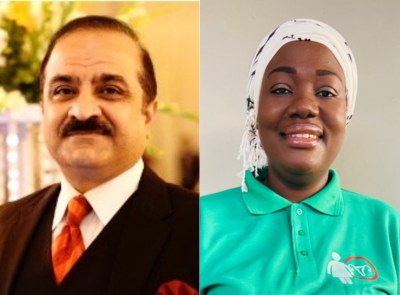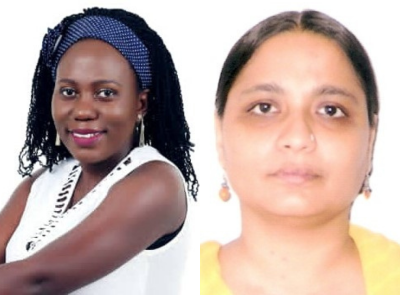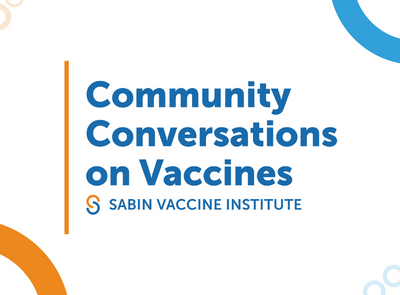VARN 2023 Preview: Vaccine acceptance research, solution co-creation with Daniela Da'Costa Franco and Deepa Risal Pokharel
Daniela Da’Costa Franco and Deepa Risal Pokharel explore the role of behavioral science and community engagement to overcome vaccination challenges.
Sabin Vaccine Institute’s Community Conversations on Vaccines, presented by Immunization Advocates, explores issues related to vaccines and immunization in low- and middle-income countries through discussions with close-to-community professionals, including health workers, journalists, and researchers.
In this episode, co-hosts Vince Blaser and Francesca Montalto are joined by Daniela Da’Costa Franco, a research guest at the Unit of Medical Anthropology, technical advisor at the Ministry of Health in Guatemala, and grant partner for Sabin’s Social and Behavioral Research Grants Program, and Deepa Risal Pokharel, senior advisor-social behaviour change and team lead for Immunization Demand at UNICEF Headquarters in New York City. They explore the evolution of vaccine communications and outreach campaigns for immunization and the importance of inclusive approaches in addressing the largest sustained global decline in routine immunization coverage in 30 years, the vital role of behavioral science and community engagement in overcoming challenges like misinformation and vaccine acceptance, as well as the need to promote multidisciplinary research and human-centered design to ensure culturally relevant solutions for Indigenous communities. Daniela and Deepa also preview the 2023 Vaccination Acceptance Research Network Conference (VARN 2023), happening June 13-15 in Bangkok, Thailand.
Daniela is a grant partner with the Sabin Vaccine Institute’s Social and Behavioral Research grants program. She worked as a researcher at the UVG Health Studies Center in Guatemala, where she was the co-principal investigator of a project supported by Sabin, which aimed to generate recommendations for the COVID-19 vaccine plan in Solola, Guatemala. She was also a coordinator of the COVID-19 surveillance system Santiago Utz Ruwach, a telemedicine system for COVID-19 patients in Santiago Atitlán, Guatemala.
Deepa has extensive experience around the world in the field of communication for development, spanning more than 25 years. Throughout her extensive career, which began in her native Nepal, she has primarily focused on managing C4D programs across diverse sectors. Her expertise lies in devising and implementing effective communication strategies and plans to aid governmental bodies in multiple countries. Deepa leads community-based training on communications for development, including creating communication materials and overseeing C4D research and surveys.
Learn more from Daniela and Deepa by checking out the key takeaways of this episode below or the transcript.
Key Highlights:
- 02:59 – 08:49 – The Evolution of Immunization Outreach and Communications – Over the past 25 years, Deepa has witnessed remarkable changes in the social and behavioral fields. Initially focused on providing information created by institutions and delivered only by health workers, the introduction of mass media expanded outreach capacity. With the rise of social media, communication channels multiplied, offering both benefits and challenges. Digital communication advancements allowed for rapid testing and monitoring, enabling tailored messaging and co-created campaigns with communities and with private and academic sectors. The science of behavior change gained importance, emphasizing community engagement and the co-creation of solutions. Despite hurdles like misinformation impacting vaccine acceptance, the progress made in vaccine acceptance and communication strategies is substantial, marking a positive trajectory in this vital field.
- 08:50 – 13:04 – Promoting Inclusive Vaccine Acceptance – Daniela emphasizes the significance of multidisciplinary research and human-centered design in her work, particularly in the context of vaccine acceptance and demand. By valuing diverse research methods, Daniela aims to develop culturally relevant solutions that address the specific needs of Indigenous communities in Guatemala. Instead of relying on ineffective, top-down approaches, she advocates collaborative efforts that incorporate various perspectives, to ensure the successful implementation of vaccination campaigns. This approach fosters a horizontal dialogue among researchers, institutions, government, and participants, leading to more inclusive and impactful outcomes.
- 13:04 – 14:58 – Understanding the Transdisciplinary Approach – Transdisciplinary methods involve integrating diverse perspectives to solve problems. Daniela’s research aims to address vaccine acceptance challenges in Guatemalan Indigenous communities. She formed a transdisciplinary team to collect data on the reasons behind these attitudes and to share the findings with the communities. The process involves four phases: training and team building, data collection and analysis, incorporating historical, cultural, and contextual data, and engaging specific groups not represented in surveys and focus groups.
- 15:50 – 22:00 – Preview of VARN 2023 – Deepa outlines what she and organizers from Sabin and UNICEF hope to see at the Vaccination Acceptance Research Network Conference (VARN 2023) in Bangkok, Thailand June 13-15, 2023. According to data from UNICEF and the World Health Organization, 67 million children have missed critical routine vaccinations in the past three years, including 48 million zero-dose children. Deepa says it is crucial to bring together experts, researchers, practitioners, and government representatives from around the world. VARN offers a unique platform for sharing experiences and learning from a vast knowledge base, focusing on evidence-based strategies across low- and middle-income countries to foster collaboration and knowledge exchange.
Connect with Our Guests
Connect with Daniela Da’Costa Franco on Twitter. Learn more about Daniela’s work:
Abriendo Caminos: Transdisciplinarity research of the COVID-19 vaccine hesitancy in Guatemala
This project was carried out between June and August 2022 with the aim of understanding the reasons that modulated the acceptance of the vaccine against COVID-19, and to generate evidence to support the creation of more culturally pertinent strategies towards vaccination. The investigation was directed by a research team from the Medical Anthropology Unit, from the Center for Health Studies of the Universidad del Valle de Guatemala.
Engaging Young Community Leaders: Social and Behavioral Research Grants Spotlight
Meet Our Guests











